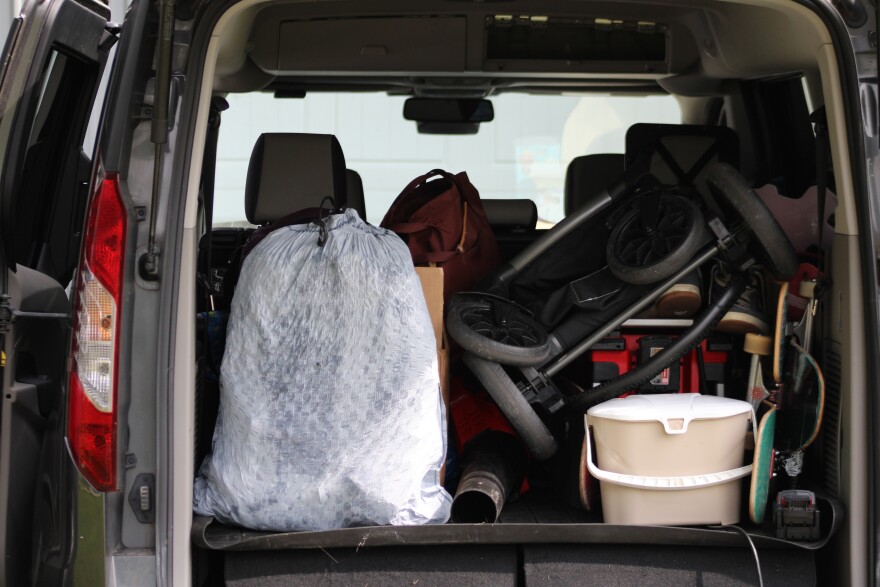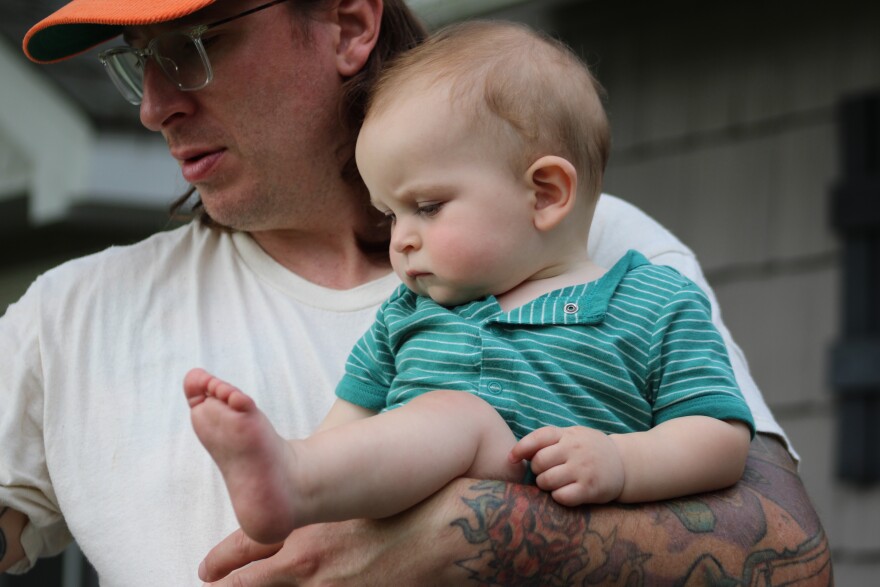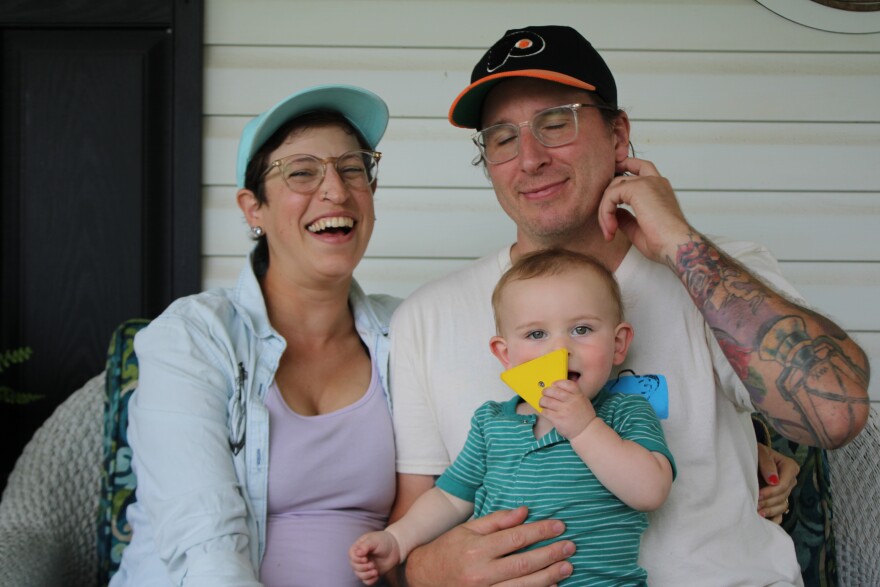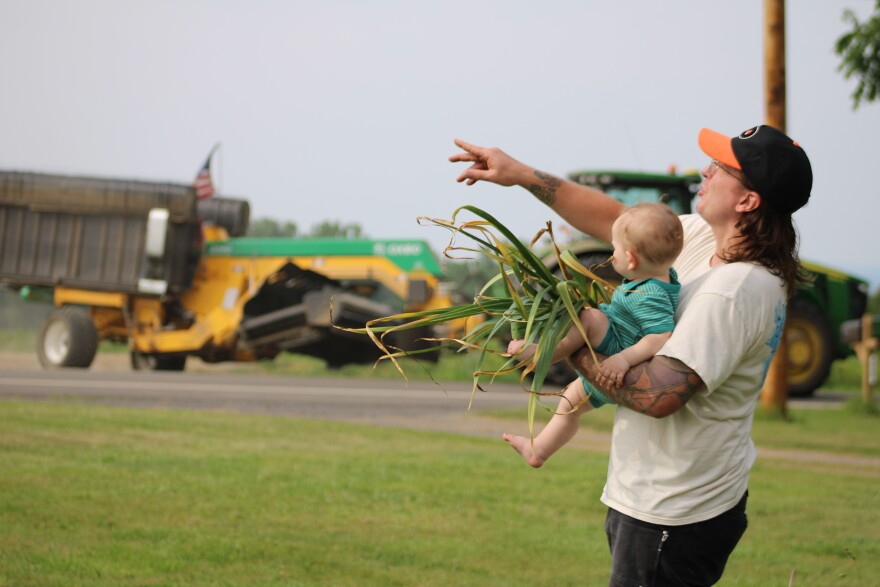A typical Friday for Alana Byrd and Ryan Dudek is characterized by packing. Lots of it.
There’s a cooler, a backpack, and two totes, and that’s not counting what's already been stuffed into their van.
The reason for all that packing is their son, Marian.

Marian is 11 months old and the couple’s first child. They have another baby on the way who is due in December. The new baby will join them in their farm home in the Hamlet of King Ferry in Cayuga County.
Both Dudek and Byrd work remotely so they have some flexibility to spend time with baby Marian. At the same time, they are also adults with full time jobs that require full time attention.
That means, like most parents, they need childcare. Byrd said that is when King Ferry suddenly becomes “the wild west.”
“I have a subscription to care.com and I felt like 90 percent of the people who I contacted, like, didn't even respond,” she said. “The ones who did, 50 percent of them were like, ‘Oh, actually, my availability has changed.’ Or ‘I'm no longer available.’”
As a result, what they have is a patchwork of care that’s changed since Marian was born.

On Thursdays and Fridays, the family buckles Marian into the car and drives 30 minutes to Auburn. Byrd and Dudeck work their regular jobs, or a shift at the Community Skateshop they run in town. Meanwhile, Marian stays with his Grandma.
They did find a nanny to watch Marian for three days a week this summer.
Once Byrd’s college semester starts, Marian will go to daycare two days a week and spend one day with the nanny.
The yearly cost of that shifting schedule is around $23,000. A small grant from Marian’s daycare covers around $1,500 of that figure.
“You cannot possibly fathom how much money childcare takes from you,” Byrd said.
However, despite the chaos and the expense, Dudeck and Byrd actually feel like they got lucky.
According to the data, they may be right.
“Extreme challenge”
Over half of Americans live in a child care desert, meaning there’s not enough child care for the number of kids who need it. New York is no exception, particularly in more rural areas.
“The Southern Tier, and pretty much all of New York state, is a child care desert,” Melissa Perry, CEO of the Child Development Council, explained.
In much of the Southern Tier, there are more than three children under five years old per open child care spot, Perry said.
According to the state comptroller’s office, New York has the second highest child care costs in the country.
“Families are faced with that extreme challenge of finding care, especially for infants and toddlers,” Perry said.
Sixty-four percent of census tracts in the Finger Lakes region are designated child care deserts, according to a 2025 report from the New York Comptroller's Office.
In the Southern Tier, it’s even worse. Almost 70 percent of the region qualifies as a child care desert.
WSKG asked listeners to write about their experiences with child care. Some said they put their babies on waitlists for daycare before they were even born.

Once a family gets off the waitlist and into a nursery, the bills start rolling in. Perry said it can sometimes be one of the largest expenses in a family’s budget.
“Child care costs rival that of a year's tuition at a SUNY college, or the cost of a mortgage.”
Although estimates of child care costs vary, a 2025 report from the state comptroller’s office found that New York parents pay $14,621 a year on average for care. Infant care is particularly expensive. In 2023, The NYS Department of Labor reported that infant care at a daycare center costs an average of $21,826 annually.
A 2025 Cornell University study found that the average cost of full-time child care at a daycare center in Tompkins County was $28,600 a year for an infant.
There is state aid for families below a certain income level, although that money is running out in some counties.

“A luxury good”
Economist Kathryn Anne Edwards said some of the families who are being hit the hardest by high costs and low availability are the ones in the financial middle, like Byrd and Dudek.
“Families who aren't rich enough to afford the luxury we've built around children, but who aren't poor enough to qualify for these basic needs support programs, they are being squeezed,” she said.
All this comes amid a push from the White House for women to have more babies, publicly mulling baby bonuses and motherhood medals.
In January, JD Vance told attendees at the March for Life, “our society has failed to recognize the obligation that one generation has to another is a core part of living in a society to begin with."
"So let me say, very simply, I want more babies in the United States of America.”
However, between high costs and low availability, getting care for babies that have already been born has become a big problem.
That’s on top of rising costs for necessities, like food and housing. Edwards said many parents simply cannot afford more kids, even if they want them.
“U.S. economic and social policy has slowly moved children to becoming a privilege and a luxury good,” she said.
A recent poll from the Associated Press also found that a majority of U.S. adults care less about the birth rate and more about making child care affordable.
Only 28 percent of Americans say declining birthrates are a major issue, whereas 76 percent say the cost of child care is a major issue.
“This is a worsening problem, and since child care sits at the center of fertility and labor force participation, something's going to change, because both of those are going in the wrong direction right now,” Edwards said.
Until that something changes, families like Alana Byrd and Ryan Dudek’s have to make do with what they have.
Byrd said she believes the current U.S. child care system is not supportive of parents, but she said would make the choice to have children 10 times over.
“Despite all the troubles and expenses and uncertainty that comes with having a kid and having another one on the way, every second of it is worth it,” she said.
This story is part of WSKG's continuing coverage of child care. It was made possible because of listener responses to WSKG’s child care survey.





